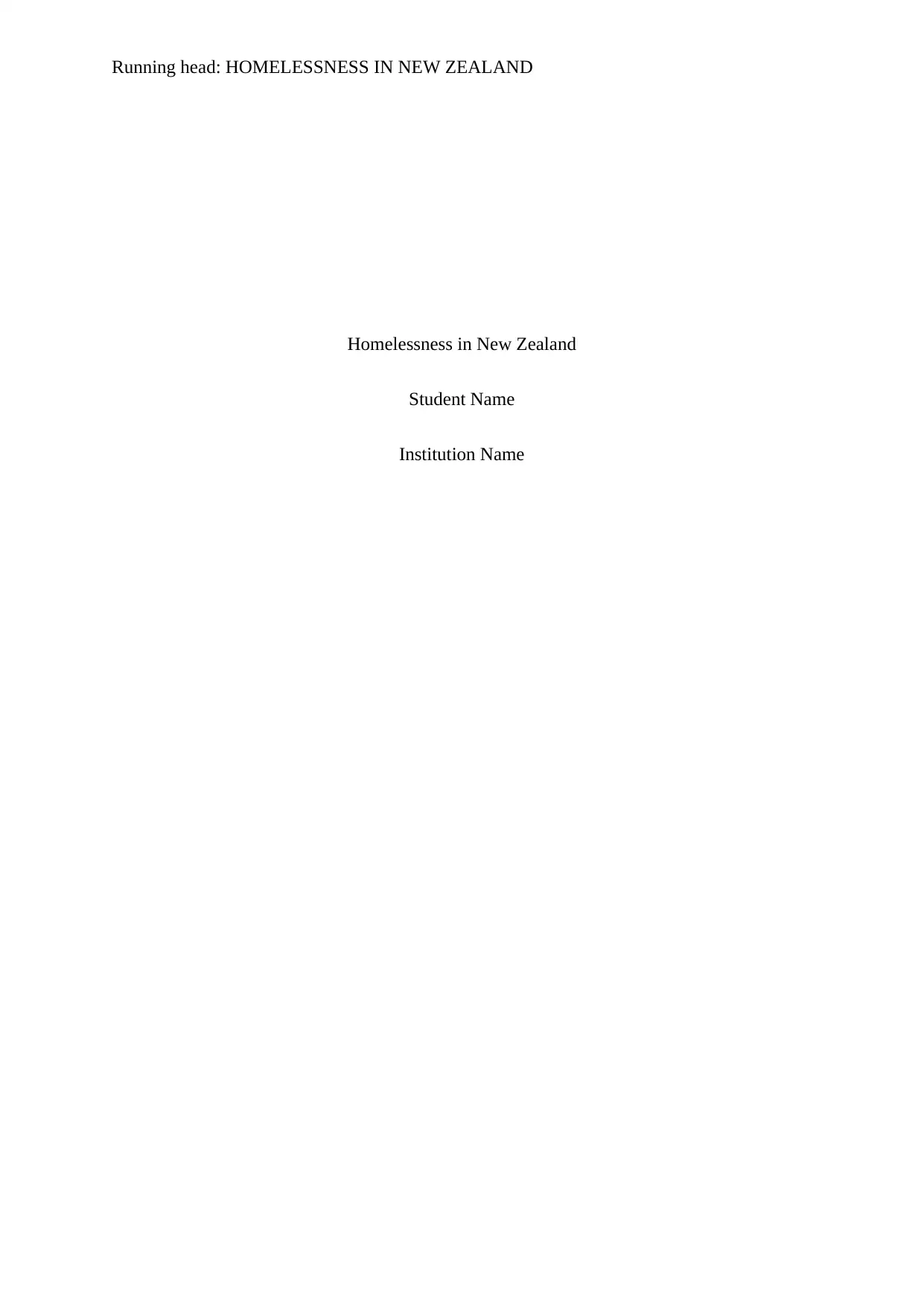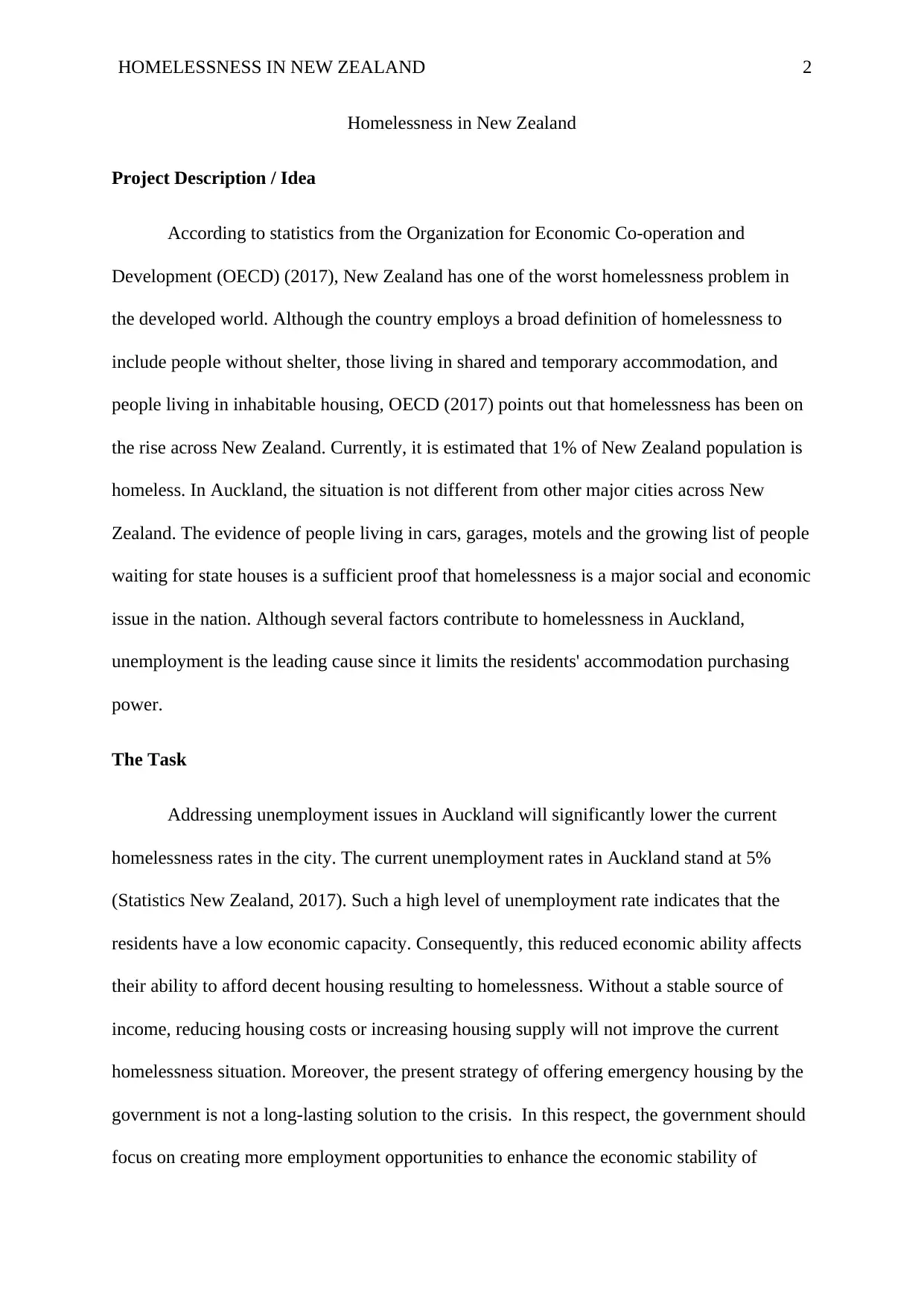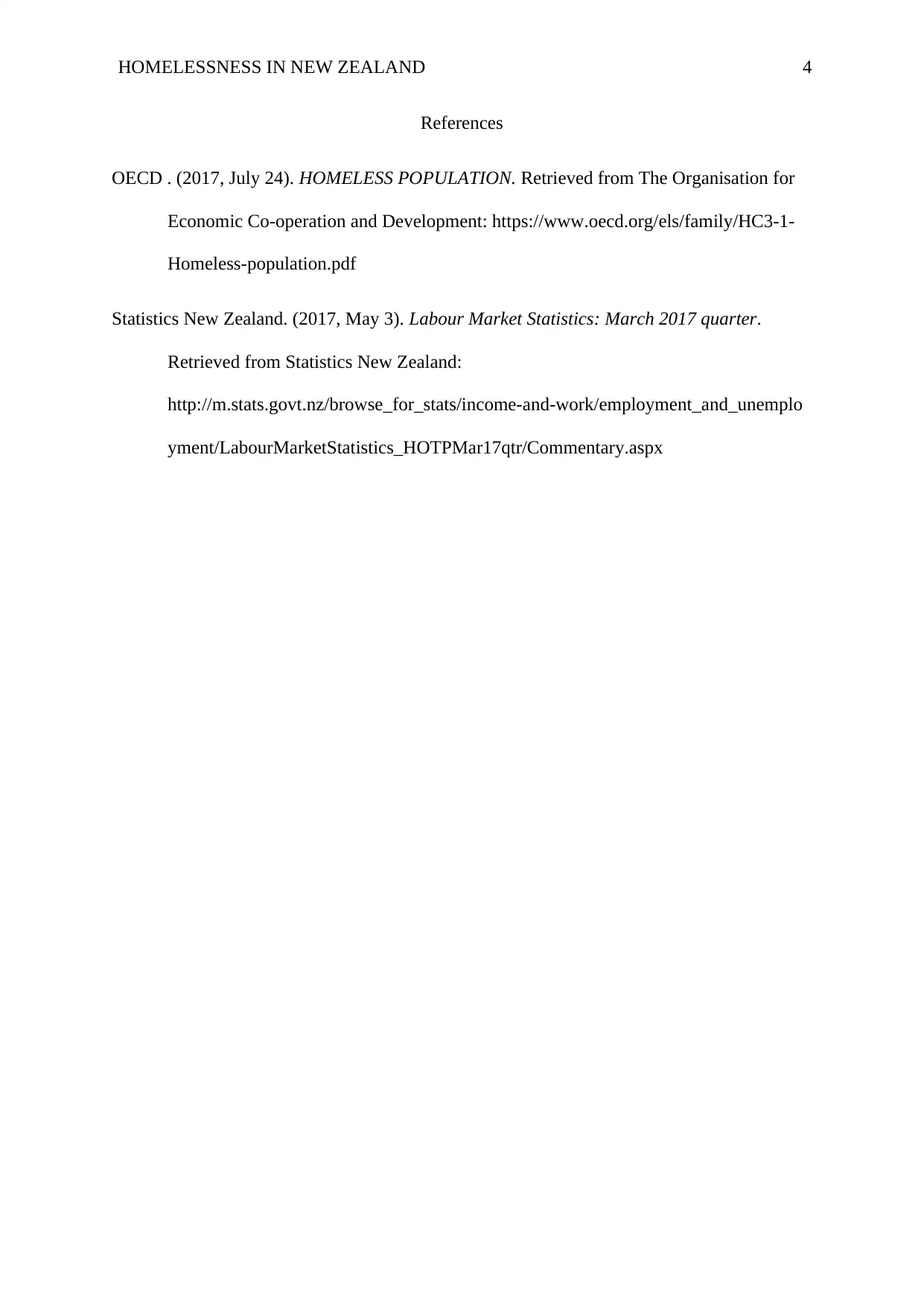Homelessness in New Zealand Project
VerifiedAdded on 2020/03/23
|4
|430
|96
Project
AI Summary
This project examines the rising homelessness issue in New Zealand, particularly in Auckland, highlighting the correlation between unemployment and housing instability. It emphasizes the need for government intervention to create job opportunities as a sustainable solution to reduce homelessness.

Running head: HOMELESSNESS IN NEW ZEALAND
Homelessness in New Zealand
Student Name
Institution Name
Homelessness in New Zealand
Student Name
Institution Name
Paraphrase This Document
Need a fresh take? Get an instant paraphrase of this document with our AI Paraphraser

HOMELESSNESS IN NEW ZEALAND 2
Homelessness in New Zealand
Project Description / Idea
According to statistics from the Organization for Economic Co-operation and
Development (OECD) (2017), New Zealand has one of the worst homelessness problem in
the developed world. Although the country employs a broad definition of homelessness to
include people without shelter, those living in shared and temporary accommodation, and
people living in inhabitable housing, OECD (2017) points out that homelessness has been on
the rise across New Zealand. Currently, it is estimated that 1% of New Zealand population is
homeless. In Auckland, the situation is not different from other major cities across New
Zealand. The evidence of people living in cars, garages, motels and the growing list of people
waiting for state houses is a sufficient proof that homelessness is a major social and economic
issue in the nation. Although several factors contribute to homelessness in Auckland,
unemployment is the leading cause since it limits the residents' accommodation purchasing
power.
The Task
Addressing unemployment issues in Auckland will significantly lower the current
homelessness rates in the city. The current unemployment rates in Auckland stand at 5%
(Statistics New Zealand, 2017). Such a high level of unemployment rate indicates that the
residents have a low economic capacity. Consequently, this reduced economic ability affects
their ability to afford decent housing resulting to homelessness. Without a stable source of
income, reducing housing costs or increasing housing supply will not improve the current
homelessness situation. Moreover, the present strategy of offering emergency housing by the
government is not a long-lasting solution to the crisis. In this respect, the government should
focus on creating more employment opportunities to enhance the economic stability of
Homelessness in New Zealand
Project Description / Idea
According to statistics from the Organization for Economic Co-operation and
Development (OECD) (2017), New Zealand has one of the worst homelessness problem in
the developed world. Although the country employs a broad definition of homelessness to
include people without shelter, those living in shared and temporary accommodation, and
people living in inhabitable housing, OECD (2017) points out that homelessness has been on
the rise across New Zealand. Currently, it is estimated that 1% of New Zealand population is
homeless. In Auckland, the situation is not different from other major cities across New
Zealand. The evidence of people living in cars, garages, motels and the growing list of people
waiting for state houses is a sufficient proof that homelessness is a major social and economic
issue in the nation. Although several factors contribute to homelessness in Auckland,
unemployment is the leading cause since it limits the residents' accommodation purchasing
power.
The Task
Addressing unemployment issues in Auckland will significantly lower the current
homelessness rates in the city. The current unemployment rates in Auckland stand at 5%
(Statistics New Zealand, 2017). Such a high level of unemployment rate indicates that the
residents have a low economic capacity. Consequently, this reduced economic ability affects
their ability to afford decent housing resulting to homelessness. Without a stable source of
income, reducing housing costs or increasing housing supply will not improve the current
homelessness situation. Moreover, the present strategy of offering emergency housing by the
government is not a long-lasting solution to the crisis. In this respect, the government should
focus on creating more employment opportunities to enhance the economic stability of

HOMELESSNESS IN NEW ZEALAND 3
Auckland residents and the entire nation. In fact, the current housing crisis is a reflection of
the economic struggles of the citizens. With stable a source of income, the citizens will have
the financial ability to acquire decent housing.
Auckland residents and the entire nation. In fact, the current housing crisis is a reflection of
the economic struggles of the citizens. With stable a source of income, the citizens will have
the financial ability to acquire decent housing.
⊘ This is a preview!⊘
Do you want full access?
Subscribe today to unlock all pages.

Trusted by 1+ million students worldwide

HOMELESSNESS IN NEW ZEALAND 4
References
OECD . (2017, July 24). HOMELESS POPULATION. Retrieved from The Organisation for
Economic Co-operation and Development: https://www.oecd.org/els/family/HC3-1-
Homeless-population.pdf
Statistics New Zealand. (2017, May 3). Labour Market Statistics: March 2017 quarter.
Retrieved from Statistics New Zealand:
http://m.stats.govt.nz/browse_for_stats/income-and-work/employment_and_unemplo
yment/LabourMarketStatistics_HOTPMar17qtr/Commentary.aspx
References
OECD . (2017, July 24). HOMELESS POPULATION. Retrieved from The Organisation for
Economic Co-operation and Development: https://www.oecd.org/els/family/HC3-1-
Homeless-population.pdf
Statistics New Zealand. (2017, May 3). Labour Market Statistics: March 2017 quarter.
Retrieved from Statistics New Zealand:
http://m.stats.govt.nz/browse_for_stats/income-and-work/employment_and_unemplo
yment/LabourMarketStatistics_HOTPMar17qtr/Commentary.aspx
1 out of 4
Related Documents
Your All-in-One AI-Powered Toolkit for Academic Success.
+13062052269
info@desklib.com
Available 24*7 on WhatsApp / Email
![[object Object]](/_next/static/media/star-bottom.7253800d.svg)
Unlock your academic potential
Copyright © 2020–2025 A2Z Services. All Rights Reserved. Developed and managed by ZUCOL.




